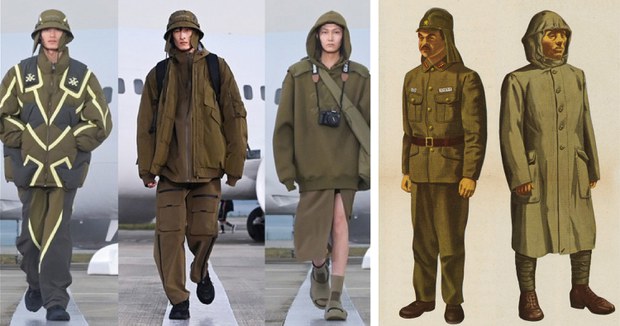Chinese sportswear brand apologizes after fashion likened to Japanese WWII uniforms
Share

Chinese sportswear brand Li-Ning has apologized after some of its latest fashion clothing sparked public anger in China over a perceived resemblance to Japanese World War II military uniforms.
The company, founded by retired Olympic gymnast and billionaire Li Ning, made the statement after being deluged with complaints that its “Chasing Dreams Airport Collection” of down khaki parkas, hats and hoodies looked like vintage Japanese uniforms.
Some items from the Sept. 20 fashion shoot were slammed as copies of Japanese war-time clothing, with users posting photos side-by-side for comparison.
The company described the collection, which included hats with earflaps commonly associated with Japanese uniforms, as being inspired by “ancient Chinese helmets.”
“Li-Ning sincerely apologizes for the perplexity and doubt caused by some of the products in its Chasing Dreams collection, the design and appearance of which have sparked online discussions in recent days,” the company said in a statement on its official Weibo account.
“The Chasing Dreams collection took aviation as its theme, finding inspiration in the clothing worn by pilots, to show how humanity continues to search the skies for its dreams,” the statement said.
“The inspiration from the pilot hat that sparked the most discussion came from an ancient Chinese helmet,” Li-Ning said. “We will continue to listen carefully to people’s feedback and suggestions.”
The statement didn’t appease everyone on Weibo, however.
“Shouldn’t the very first words be an apology?” @Big_head_girl_one commented, while @I_met_you_in_my_dream said it was an unacceptable response from a native of Nanjing, whose elderly population still remember the 1937 Nanjing Massacre, in which the International Military Tribunal for the Far East estimated at least 200,000 murders and at least 20,000 cases of rape.
“As a native of Nanjing, I can’t accept this … because I keep hearing the older generation talk about their experiences in that year,” the user wrote.
“I’m never buying Li-Ning again,” added @warm_winter_sun_cf566, while @small_windy_mud commented: “Speechless.”
Trolls at work?
Others, however, thought the complaints were far-fetched, and the work of trolls.
“It’s like people who can’t tell the difference between a Nazi [swastika] and a Buddhist [manji] criticizing Buddhists for using Nazi symbols,” @Yuanxi_21711 commented, while @half_a_catty_and_eightyli said the clothing looked nothing like Japanese uniforms.
“This isn’t a standard Japanese flight suit — the shape and color are different,” the user wrote. “Is Li Ning being trolled by his opponents?”
Ho Tsung-hsun, chairman of the Taiwan Citizen Participation Association, said the “fragility” of online comments were linked to Beijing’s authoritarian brand of nationalism.
“This isn’t the first time this has happened and it won’t be the last,” Ho told RFA. “If they hadn’t apologized, their business and public image could be affected.”
“This is a dictatorship, and its people are so fragile.”
Translated and edited by Luisetta Mudie.







